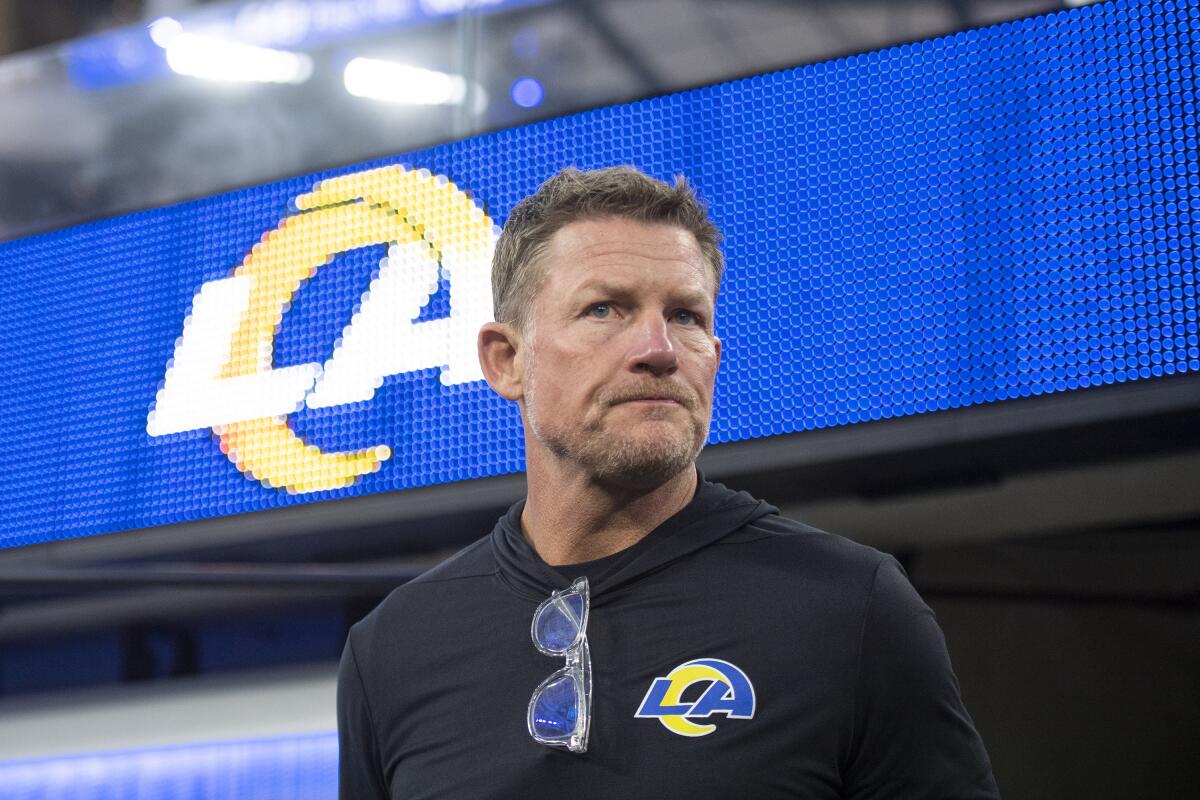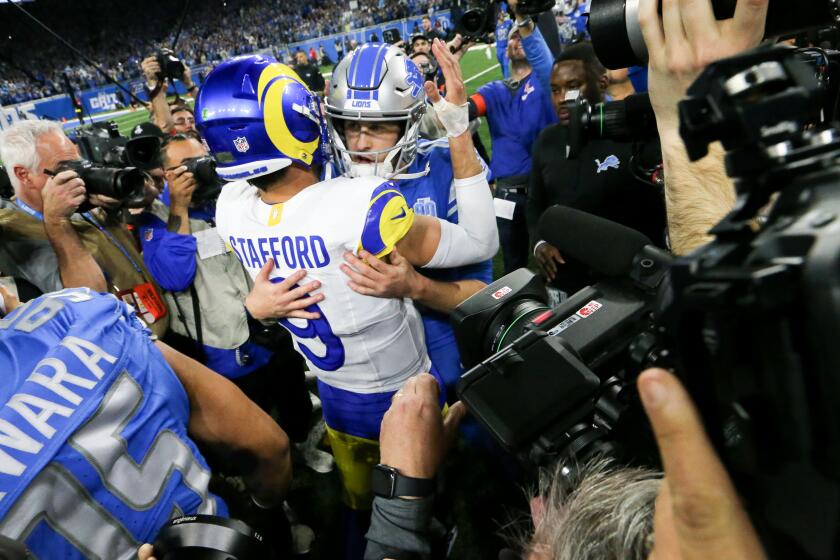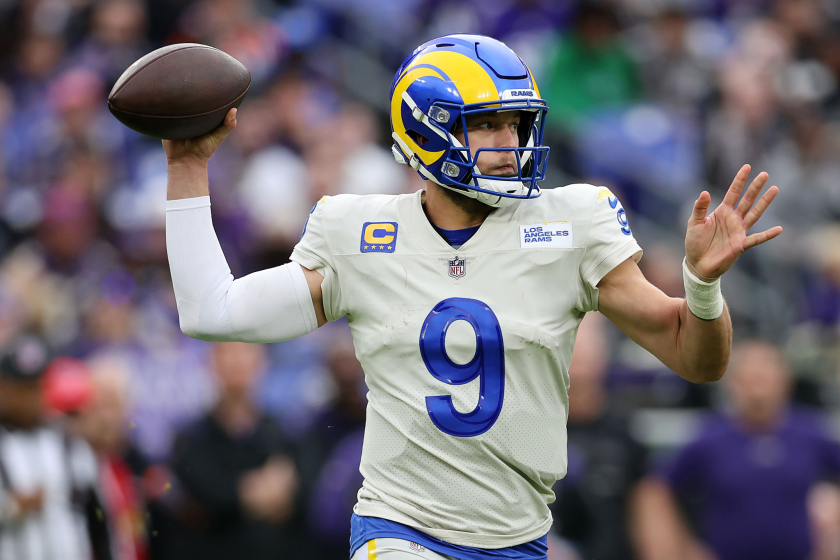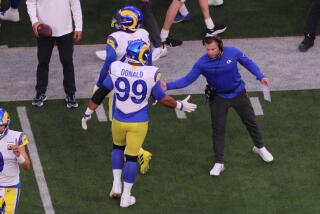Column: To win like the Rams, take big risks and learn from your losses

Every leader in every business hits a crossroads. In that regard the Los Angeles Rams’ Les Snead is no different. It’s how he decides which way to go that sets him apart — and perhaps there’s a lesson in that for all of us.
Opinion Columnist
LZ Granderson
LZ Granderson writes about culture, politics, sports and navigating life in America.
At the season opener against the Lions on Sunday night, for the first time in a decade, Los Angeles will not have Aaron Donald on the roster. The three-time Defensive Player of the Year retired following the Rams’ playoff loss in Detroit last season. And it’s in the Motor City where this new chapter begins.
Detroit native LZ Granderson joins Lions fans celebrating an elusive playoff win and the belief Jared Goff will finally lead the team to a Super Bowl.
Back in 2014, the scouting report on the All-American said Donald was too small, at barely 6 feet. Snead, in just his second draft as general manager, ignored those reports and selected Donald as No. 13 anyway. And with 43 seconds left in the 2022 Super Bowl, and with the Rams clinging to a 23-20 lead, it was Snead’s 2014 gamble who got to Bengals quarterback Joe Burrow, ending the threat.
Bucking the scouting report on Donald wasn’t even his biggest gamble in the draft that year.
Snead also selected Michael Sam, marking the first time an out gay man had been drafted in the NFL. Like Donald, Sam was considered undersized in scouting reports, although he did unanimously win SEC Defensive Player of the Year. A media frenzy accompanied the history-making move, but ultimately, Sam didn’t make the final roster. However, Snead had established himself as a bit of a maverick — with mixed results, we now know.
Because of the dominance of Donald and the history surrounding Sam, we tend to forget that 10 years ago this maverick also had the No. 2 pick, and he used it on one of the biggest busts in league history.
“We picked Greg Robinson first, so the system we were using definitely needed adjustments,” Snead told me this week. “That year, it was kind of fun because we had those two picks.” Although there were multiple future Hall of Famers around Robinson in the 2014 draft, Snead didn’t snap up any of them. Instead he used the No. 2 pick to draft a player who ended up out of the league in less than five years.
That bad decision was offset by the success of Donald. After Robinson, no one could have faulted Snead if he had decided to be more cautious at the next crossroads. He wasn’t.
The quarterback came from the Lions with a string of losses and a lot of personal potential. Will it add up to a Super Bowl berth?
There’s something to be said about the same leader who drafted the NFL’s first out gay player also being the same GM who hired the league’s youngest coach since the 1930s. And don’t forget: Before coming to the Rams, quarterback Matthew Stafford had been in the league 10 years and had never won a playoff game. This maverick sent three picks and Jared Goff, a quarterback who had won playoff games, to Detroit in exchange for Stafford.
So while it’s true that every front office makes mistakes, not many GMs would double down on big gambles after Robinson and Sam. That’s why I wanted to pick Snead’s brain. The experience from that 2014 crossroads has to be applicable to other parts of life, right?
“One of the lessons you learn is ‘curse of the top 10,’ ” he told me about his decision-making process. “A lot of times when you’re picking in the top 10, you’re trying to find a freak versus a football player, right? Aaron Donald was outside of the top 10 … because there was some less freakish things about him, right? Maybe size and height. So, I always go, ‘Beware of the curse of the top 10 because sometimes you’re looking for a freak athlete or this unique athlete and not necessarily a really good football player.’
“That doesn’t mean physical gifts aren’t important,” he said, only that “he better have that stuff inside where every day you’re going to make a choice to try to go be great and not just good or not just above average.”
Another Snead tidbit: Managing your emotions is key to growth because “it’s very easy to feel a lesson.”
“By that, hey, you pick Greg Robinson, it doesn’t work out,” he said. “You get punished for it, not just internally, but even from a standpoint of reputationally, right? However you want to call it. You can feel that. That’s the easiest part of the lesson. Now: Can you learn a lesson from it? The hardest part is going to be applying it.”
After missing on top 10 pick Robinson in 2014, the next season Snead took a chance on Todd Gurley with the 10th pick, even though the running back had ended his college career with a torn ACL. Gurley rewarded him by winning Rookie of the Year.
“We’re betting on human beings,” Snead said of his hiring process. “It’s better to have a false negative than a false positive. A false negative being, ‘We don’t think that player can help the Rams.’ Maybe that player then goes on and helps someone else. We can probably live through that situation. But if you go false positive and you think, ‘that player’s going to help the Rams,’ but he doesn’t … you’re now relying on someone you thought was going to be a net positive for you but unfortunately isn’t.”
Which brings us to Sunday’s opener in Detroit.
This is not only the scene of Donald’s final game, but also where Goff, the player Snead swapped for Stafford, got a measure of revenge. Stafford led the Rams to the Super Bowl, but since then, Goff’s Lions have been the team on the rise.
It was a tough moment for the Rams. But we all have those. Snead says losses provide a useful “base rate of who we are”: “This is our strengths. This is our weaknesses. We got an opponent the next week. How quickly can we apply those lessons, to go on and continue playing good football and maybe get a chance to play an opponent again in the tournament when it counts? No moral victories, just lessons.”
More to Read
A cure for the common opinion
Get thought-provoking perspectives with our weekly newsletter.
You may occasionally receive promotional content from the Los Angeles Times.













